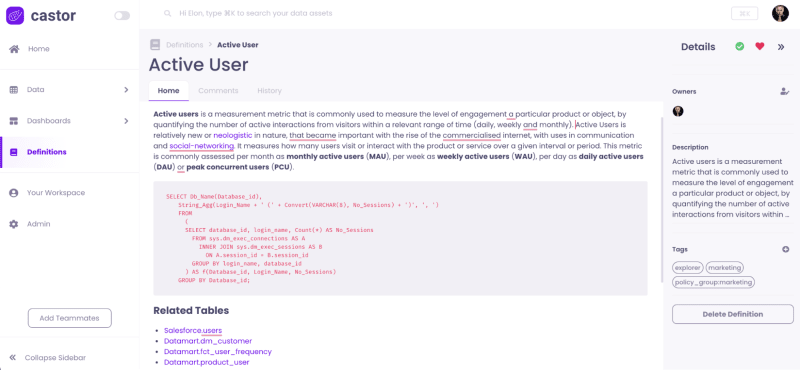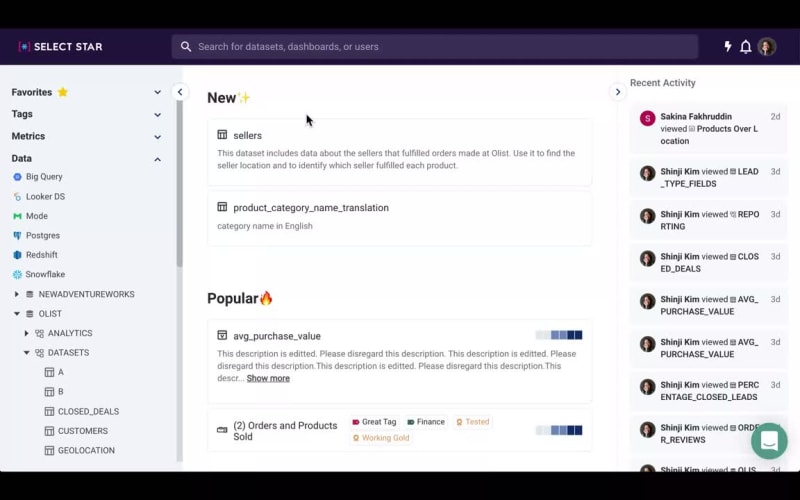Knowledge is power. Today, knowledge in organizations means having the capability to control and utilize data. It requires specific tools and skills to generate contextualized and organized data catalogs from lakes and oceans of siloed data -- a process known as data discovery.
It's no wonder experts recommend that businesses prioritize data discovery and classification tools in 2023. This statement is especially true considering how difficult it is to govern data and draw insights from it without a proper data catalog.
In this post, we'll briefly review what data discovery means in the context of data engineering and analytics and give you a few tips on choosing the right data discovery tools for your needs. Finally, we'll present our list of the ten highest-rated data discovery tools.
What is Data Discovery?
Data discovery can mean different things to different professionals. For information security and DevSecOps teams, it means detecting misconfigurations and data sprawl. On the privacy and compliance front, data discovery focuses on identifying, classifying, and protecting sensitive data as per regulatory requirements and best practices.
[
In data engineering and analytics, data discovery refers to the process of finding and contextualizing relevant data sets across your corporate data stores. You can also describe data discovery as a business intelligence architecture that generates metadata to centralize non-uniform and siloed data sources for analysis. Data discovery is an essential part of data management and governance as it enables other data consumers to quickly and easily find the information they need in a data catalog.
Why Businesses Need Data Discovery Tools?
- Visibility: Data discovery tools aim to give organizations holistic visibility into their information assets, making it easier for data users (e.g. engineers, analysts) to work with data.
- Serve data to different types of users: Even non-technical business users (e.g. sales and marketing teams) can gain valuable insights that drive decision-making without having to learn the ins and outs of data warehousing frameworks and BI tools.
- Data contextualization: These tools generate an overview of all your data assets across departmental and branch-specific data silos and unify it all to inform business decisions.
[
How to Choose the Right Data Discovery Tool for Your Business?
- Search for ROI: Consider your business goals and data management budget and look for solutions that will scale with your business's and data users' needs.
- Seek synergy with your DataOps stack: Your data management toolset and pipelines should work cohesively with your chosen data discovery tool.
- Collaborate: In choosing the right data discovery tool for your business, it's wise to seek out the insights of all the potential users of the tool. In addition, collaboration between stakeholders and data owners is an essential feature of any data discovery solution.
Top 10 Data Discovery Tools
1. Informatica
[
](https://www.informatica.com/products/data-catalog.html)
InformaticaEnterprise Information Catalog is a data discovery tool that employs machine learning to collect data assets across the various data silos within a corporation. Informatica EIC requires a high level of technical expertise to integrate, manage, and scale. In addition, users describe it as not user-friendly.
Key features:
● Scanning and indexing of metadata.\
● Discovering and profiling of data.\
● Data dependency tracking.
Best for: Large enterprises in highly regulated industries.
2. Aggua
[
](https://www.aggua.io/your-data-catalog)
Aggua is a data fabric platform that enables data and business teams access to their data, creating trust and providing practical data insights. Aggua's automated data catalog gives businesses a bird's eye view of all their data, along with column-level lineage across systems providing a single source of truth over data assets and business terms.
Aggua's data catalog provides rich, descriptive, and contextual key components that enable smart data discovery, filters on verified data, and proactive suggestions and findings, including cost, performance, popularity, and data usage.
Key features:
● Automatic end-to-end data documentation.\
● Data FinOps and cost management: Discovering inefficiencies with data spending (such as identifying duplicates, data pulled too frequently and not making it to production, etc).\
● One-stop-shop for data integration and cataloging, making everything in your data universe searchable.\
● Seamless integration with Snowflake, BigQuery, DBT, Fivetran, ReDash, Redshift, Airflow, Google Looker, ThoughtSpot, and more.
Best for: Cloud-native and cost-conscious businesses with Snowflake or BigQuery at the heart of their data warehouse architecture.
3. Castor
[
Castor is a data catalog designed for mass adoption across the company. A relative newcomer to the arena of data discovery tools, Castor aims to provide an overview of your entire data environment. Built for anyone in the organization, regardless of their data literacy level or department, Castor helps users find, understand, and trust data.
Key features:
● Data searching.\
● Faceting and filtering.\
● Social exploration.\
● Lineage discovery.
Best for: Organizations with varying levels of data literacy among data discovery tool users.
4. Microsoft Azure Purview
[
](https://azure.microsoft.com/en-in/products/purview/)
Azure Purview automates data discovery to provide you with an up-to-date map of your cloud, on premises, and SaaS data. While most users agree that Purview is a reliable and easy-to-use choice for automating data discovery, some have reported that it is fairly expensive for SMEs. Another issue is that it works primarily with data stacks based on Microsoft Azure.
Key features:
● The Data Map service.\
● Data scanning and classification features.\
● Glossary of search terms to help with data discovery.
Best for: Enterprises running on Azure that need a central hub and ecosystem to automate and manage all their data governance needs.
5. Alation
[
Alation's enterprise data catalog employs a Behavioral Analysis Engine (BAE) that leverages machine learning pattern recognition to generate insights on data usage throughout the organization. However, users and reviewers alike are frustrated with Alation Data Catalog's lack of support for end-to-end lineage and auditability.
Key features:
● Data integration.\
● Active directory integration.\
● Data profiling.\
● Rules-based workflows.
Best for: Data analysts and business users at very large enterprises.
6. Collibra
[
](https://www.collibra.com/us/en)
Collibra Data Catalog can help organizations monitor data quality and pipeline reliability against dozens of databases and file systems. Built for highly technical teams, Collibra demands training and lacks an intuitive interface. In addition, users report that the cost structure of Collibra's pricing scheme can make it unaffordable for smaller businesses.
Key features:
● Data profiling.\
● Automatic data classification.\
● Guided stewardship.
Best for: Highly technical data teams in large enterprises in the financial services sector.
7. DataHub
[
DataHub is an open-source metadata platform enabling data discovery, data observability, and federated governance. Originally developed by LinkedIn, DataHub is a developer-first data discovery tool with pre-built integrations for Kafka, Airflow, MySQL, SQL Server, Postgres, LDAP, Hive, and others.
Key features:
● Metadata ingestion.\
● Data observability.\
● Data dictionary.
Best for: Highly technical fans of open-source solutions.
8. Secoda
[
Dubbing itself "the homepage for your data," Secoda is a data discovery and documentation tool that aims to make finding metadata, queries, charts, and documentation easier for everyone in the organization. Secoda is a fairly new player in the data discovery arena, and users claim it still lacks the user experience and feature set to justify its business plan pricing.
Key features:
● One-click integrations with warehouse, BI, and transformation tools.\
● Commenting and tagging for team collaboration.
Best for: Small to medium DataOps teams.
9. Atlan
[
](https://atlan.com/data-discovery-catalog/)
Atlan's data discovery tool enables users to explore all their data assets and knowledge. Although Atlan tries to provide every member of your data team with a "personalized data shopping experience", users have noted that the SaaS website tends to be slow, and the platform lacks compliant support for data access controls.
Key features:
● Data profiling.\
● Data lifecycle tracking.\
● A visual query builder.\
● Data quality impact analysis.
Best for: Small enterprises that manage very high volumes of data compared to their business size.
10. Select Star
[
](https://www.selectstar.com/)
Select Star is a data discovery and governance platform that analyzes and documents corporate data. It can connect with some of the most popular tools used in the modern data stack to track where data comes from, how it is being used, and by whom.
Key features:
● Popularity and usage analysis.\
● Discussions and notifications for end-user Q&A.\
● Companion Sidebar.
Best for: Data analysts in medium and large businesses.
Go Beyond Data Discovery with Aggua
Data discovery and data catalogs are vital tools for organizations to maintain control of their increasingly chaotic data landscape.
With Aggua, data teams can categorize, describe, and find data assets in one place. Aggua's data catalog and data discovery capabilities empower organizations to utilize their data assets by providing a new way to discover and interact with all their data pipelines. Together with the leading data lineage solution, businesses can enrich their data universe with end-to-end column-level traceability, allowing to track and map all changes on the data assets searchable in the catalog. Aggua is a one-stop-shop and a single source of truth when it comes to organization's data flow.














Top comments (0)